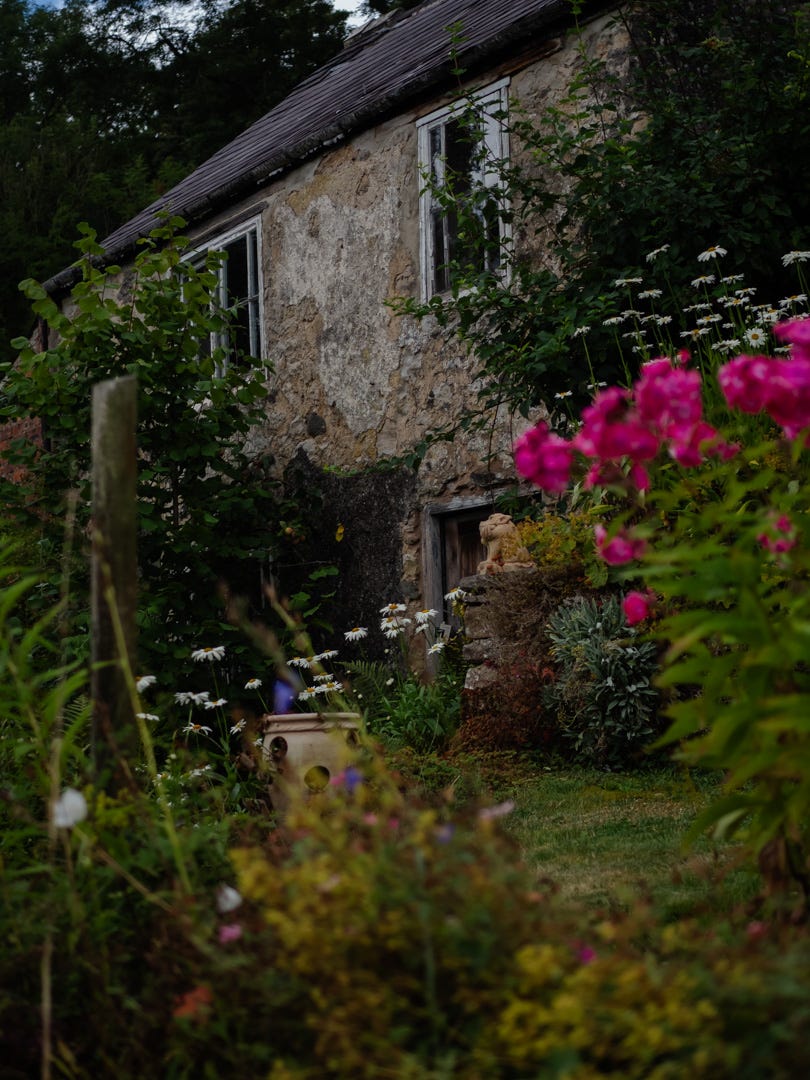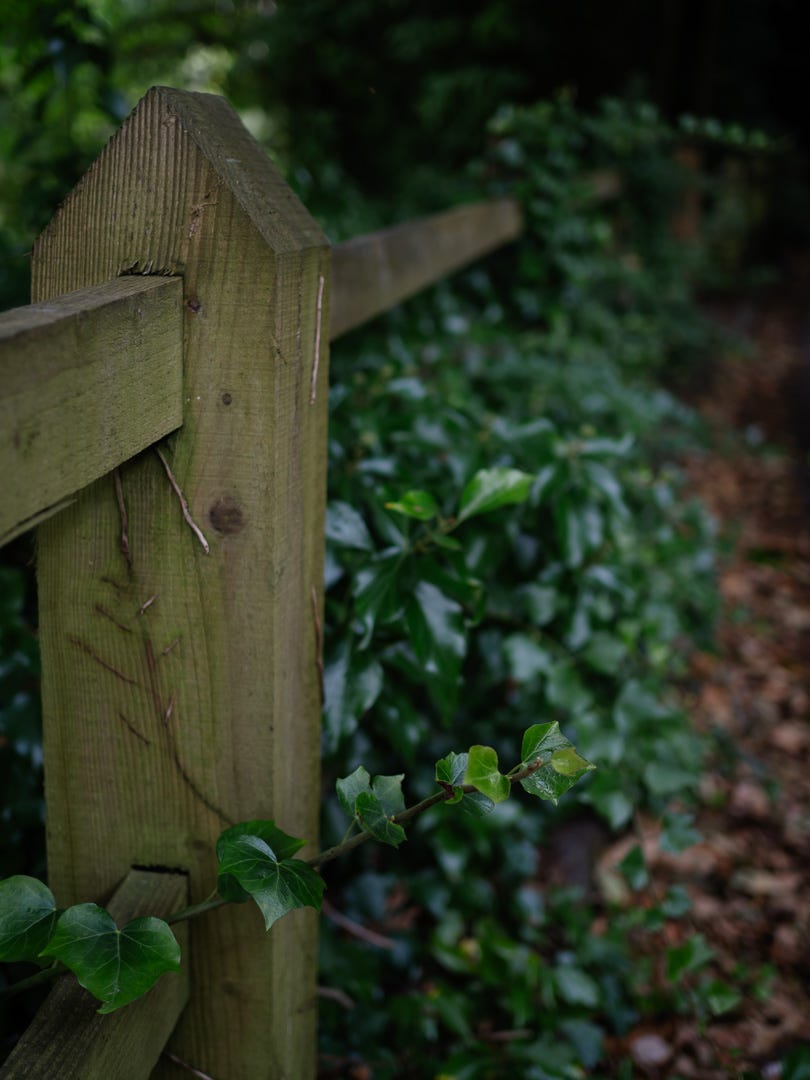Beyond the Notes | 14. Tracing the Path Home
In many respects, Woodstock sums it up: a desire to reconnect with nature, and a collective and optimistic hope and yearning for something deeper; for a better world: a true alternative.
Welcome to Rediscover · Reconnect · Re-Emerge. If you find the fleeting changes of modern life wearisome, maybe even overwhelming, join me on a journey, a path well-trodden, as I share heartfelt and often nostalgic reflections on living slowly, simply, and in tune with the seasons.
In this series, I share some of the pieces of music which have meant the most to me in my life, and the stories behind why they resonate so strongly within a life lived slowly and simply.
We've got to get ourselves
Back to the garden
I wonder how many of us grew up with copies of John Seymour’s iconic 1976 book, The Complete Book of Self-Sufficiency, on our parents’ bookshelves? He, the book, and possibly our parents, were hangovers from the 1960s, a time when the state of the world was placed in sharp focus. Seymour was a fascinating man, ahead of his time, some say even a visionary. He foresaw the rise of consumerism, industrialisation, and genetically modified organisms. He could see the impact that cars and cities were having on the health and well-being of their inhabitants. He saw a time when we would, once again, have to become self-reliant and self-sufficient, rebuilding our fundamental relationship with the natural world.
He wasn’t the only one. Think how popular the 1975 BBC sitcom, The Good Life was, Tom and Barbara ripping up their suburban garden to become self-sufficient, much to the horror of their neighbours, Jerry and Margo Leadbetter. How many of our parents read Elizabeth West’s 1977 book, Hovel in the Hills, where she describes her and her partner’s experiences as part of the back-to-the-land movement (something which
mentioned in her Slow Spotlight)?Some 50 years on, we find ourselves, perhaps lamentably, in a familiar situation. Yet Seymour’s book has been reprinted multiple times and remains a bestseller. Charity shops have been stripped of their copies of Hovel in the Hills, and The Good Life is to be found repeated on multiple television channels on an almost daily basis. Hope remains.
Yet, consumerism and industrialisation, and everything which comes with these, remain very much alive and kicking. We haven’t yet reached the time Seymour predicted, but his vision and foresight continues to inspire an ever-growing generation who seek something deeper, a deeper and more soulful connection to the land and to the natural world; a generation seeking a slower, simpler and more seasonal way of living. John Seymour has often been described as a rebel. He rebelled against the world as he saw it because he knew that eventually, these things would come back to bite us with vengeance. 50 years on, whilst we see some of the effects of that world, I think his heart would be warmed by the increasing numbers of rebels of the next generation. Not the rent-an-activists, but those of us who gently seek an alternative to the materialistic, speed-obsessed, success-driven world of the 21st century.
Being part of Rediscover · Reconnect · Re-Emerge is free, but if you’d like to support me in fostering the community we value, and help me to sustain my writing and work here, you can become a patron member for just £4 a month, or £35 a year. Patron members also receive a special, personal “thank you” in gratitude for their support. You can upgrade your subscription here.
We might ask ourselves why his book and his philosophy has endured. Perhaps it’s because we crave the same as our parents did, to embrace an alternative vision of living, against the grain of society and in tune with the natural rhythms of the changing seasons. For many of them, it was a dream lived out only in words. The books, inspiring as they were, remained on the shelves, dreams gathering dust as they found themselves weighed down by the pressures of living. Whilst today we find the same inspiration in the pages, for many of us, it remains a dream too. We can, of course, make small changes, and there are many things we can do to embrace our own version of a slower, simpler and self-sufficient way of living. But many of us dream of something else, a truly alternative way of living, physically in the place and landscape where we find our homecoming. Society’s not geared up for that. It’s not something easily reachable without sufficient money and all that comes with that. Utopia doesn’t come cheap; a capitalist society makes it as hard as possible.
Some of the most iconic songs to come out of the 1960s and 70s were about rebellion, but they were also about something deeper. Joni Mitchell’s 1970 song, Woodstock, described the four-day Woodstock Music and Arts Festival in 1969. Held at a New York state farm, it was billed as ‘3 days of peace & music’. The song epitomises the spiritual and social atmosphere of the late-60s and 70s, and much of that which was captured then, still rings true today.
Whilst I will rebelliously say I prefer the Matthews Southern Comfort cover to the Mitchell original, I love this song because it is so emphatically rooted in time and place. At the drop of a hat, it conjures up that specific moment in 20th century history. It’s also a song whose lyrics flow deep. I write a lot about journeys and about life’s journey. For many attending that 1969 festival, it was a spiritual journey, a pilgrimage and connection to something greater. It is about shared human experience, unity, a sense that together, change is possible. We are all part of the tapestry of life: ‘we are stardust, we are golden’ (a little nod to
there).I opened this post by quoting from the song’s lyrics: ‘we've got to get ourselves back to the garden’. Over 50 years later, we belong to a growing movement and community of those kindred spirits who are seeking a return to nature, to living harmoniously with the natural world, in tune with the changing seasons. Woodstock was a festival of hope, of optimism that we might rebuild and heal that which had been damaged, but just as the song suggests, it came with cautious notes.
It’s easy to get caught up in a sense of utopia, of striving for a perfect world. It’s a laudable aim, but I fear it comes with disappointment and probable disillusionment. Perhaps the ‘garden’ to which Mitchell refers is a state of mind, rather than a physical place; a sense of a return to something simpler and more authentic. Maybe one of the reasons we loved The Good Life so much, was that in Tom and Barbara’s quest for self-sufficiency, nothing was perfect. In contrast to the Leadbetter’s pristine house and garden, the Goods’ was messy, their approach haphazard and chaotic. Their quest to return to the land came with a huge dose of reality, but ultimately, their hearts were in the right place. They couldn’t change the world over night, and neither can we.
The Goods, like Seymour and West, saw, just as we do, a deep need to return to something greater, a gentler pace, a more soulful way of living with intention, and a visionary desire to live in harmony not just with the world, but with each other. In many respects, Woodstock sums it up: a desire to reconnect with nature, and a collective and optimistic hope and yearning for an alternative, for a better world.
I wonder if the final words might come from John Seymour’s obituary itself:
‘He was like a force of nature, always willing to listen, always interested in learning about new — or very old — ways of working the land. He was a one-man rebellion against modernism.’
With collective hope and intention, let us listen and learn, but remain authentic on our journey of seeking a slower, simpler and more seasonal way of living; a true and deeply-rooted alternative.
If you’re not already doing so, I’d love you to follow me over on Instagram. You can also visit the A Life More Creative website, where you can find out more about My Story, and read articles from my online Journal. Subscribe on Substack to receive new posts and to support my work:







Great post David! You are right about John Seymour being a visionary - he was born in 1914 and probably owed some of his philosophy to the utopian ideals around in the 20s and 30s but it was the sixties when he came into his own. I bought his book in the late 70s when I got married and took on a neglected walled garden in Yorkshire. There are two things he said I’ll never forget “Leaves are a tree’s defence against grass’ and “Chickens like having sex as much as people”
Happy Easter.
Great post David and very timely.
Just started watching The Good Life as it's finally on iPlayer!
Your words ring so deep and true.